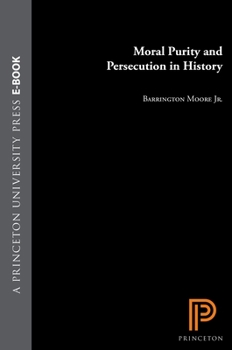Moral Purity and Persecution in History
The intellectual scope and courage to contend with the largest puzzles of human existence and organization distinguish great social thinkers. Barrington Moore's Social Origins of Dictatorship and Democracy was a foundational work of historical sociology that influenced a generation of social scientists and, decades later, continues to be widely read and taught. Here, Moore takes up the same tools of historical comparison to investigate why groups of people kill and torture each other. His answer is arrestingly simple: people persecute those whom they perceive as polluting due to their "impure" religious, political, or economic ideas. Moore's search begins with the Old Testament's restrictions on sexual behavior, idolatry, diet, and handling unclean objects. He argues that religious authorities seeking to distinguish the ancient Hebrews from competing groups invented, along with monotheism, the association of impure things with moral failure and the violation of God's will. This allowed people to view those holding competing ideas as contaminated and, more important, contaminating. Moore moves next to the French Wars of Religion, in which Protestants and Catholics massacred each other over the control of purity, and the French Revolution, which perfected terror and secularized purity. He then combs the major Asian religions and finds--to his surprise--that violent efforts to eradicate the "impure" were largely absent before substantial Western influence. Moore's provocative conclusion is that monotheism--with its monopoly on virtue and failure to provide supernatural scapegoats--is responsible for some of the most virulent forms of intolerance and is a major cause of human nastiness and suffering. Moore does not say that the monotheist tradition was the primary source of Nazism, Stalinism, Maoism, violent Hindu fundamentalism, or ethnic cleansing in Rwanda and the former Yugoslavia, but he does identify it as an indispensable cause because it justified, encouraged, and spread vindictive persecution throughout the world. Once again, Moore has drawn on his comprehensive understanding of history and talent for speaking directly to readers to address one of the most crucial questions about human past and future. This book is for anyone who has ever heard the word genocide and asked why.
Format:Hardcover
Language:English
ISBN:0691049203
ISBN13:9780691049205
Release Date:March 2000
Publisher:Princeton University Press
Length:192 Pages
Weight:1.00 lbs.
Dimensions:0.7" x 7.8" x 10.0"
Customer Reviews
3 ratings
An Exceptional Text
Published by Thriftbooks.com User , 21 years ago
Moore brings a lifetime of penetrating insights into the sociological mindset necessary to create "the moral approval for cruelty" to bear in this amazing work. It is easy to say that his research is shoddy due to the small number of examples he brings into play in the book, but that is simply because he is deliberately taking an approach whereby he leaves out the most obvious and overused examples and focuses on the ones that most people do not know about. He is providing a model and an insight that come from a lifetime of research--he leaves it up to the reader to apply these to the majority of history, and to the world at large.Christians will almost certainly like this book no more than they would like S. Dennis Ford's Sins of Omission, but it's important to be able to see the darker side of religion. We speak about how we must "never let the Holocaust happen again," but how long did it take European Jews, the very persecuted people of 1940s Europe, to turn around and turn the Palestinian people into their own subhuman subclass? How long did it take American pundits to call for forcible conversion of Islamic nations after 9/11? The lessons of this book should not be so easily dismissed...
Inciteful and Disturbing
Published by Thriftbooks.com User , 23 years ago
Although I hope that Moore's assessment of monotheism is flawed, he demonstrates an accute understanding of how group conflict emerges. He carefully shows the importance of the ritualized, pure "self", in opposition to the heathen impure "other." Given the circumstances of the NYC and DC attacks, we must ask ourselves if Moore is right or not.
Engaging and Worthwhile
Published by Thriftbooks.com User , 24 years ago
The author does a fine job of convincing us that moral zealotry and persecution, including torture and murder as well as mere reputation smearing, are typically the work of those with a sense of the pure and the impure. The chapter on the deterioration of tolerance in China is especially helpful here. Mao and his moral dogmas were the catalyst. Prior to that, a Confucian tolerance reigned. The chapter on the French Revolution shows convincingly that the purists can be revolutionary, as any walk across campus today can reveal. The author is not interested in the zealots on campus these days, but instead aims his big guns at political tyrannies such as Communism and Fascism.






